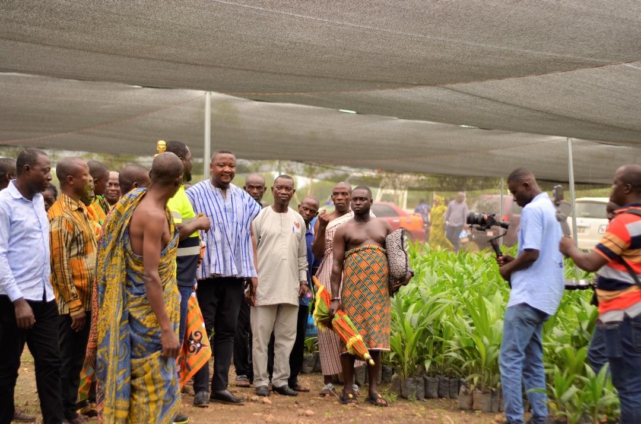The vagaries of climate change and the devastating imprints of illegal mining on farmlands are taking a toll on Ghana’s agricultural sector, food security and biodiversity.
It has been estimated the country may in the coming years struggle to feed its indigenes if measures are not instituted to fight the menace.
Fortunately, 50-acre lands in six districts within Obuasi and Adansi areas degraded by illegal mining activities are being reclaimed through the AngloGold Ashanti Obuasi Climate Resilient Oil Palm Plantation.
Several open, shallow pits spread across an abandoned illegal mining site at Adaase on the outskirts of the Obuasi Municipality.
Like other communities and agricultural plantations ravaged by artisanal mining, the impacts of the illegal activities are glaring.
The pits on the over 5-acre land have collected rain, washing away the mounds of clayey sand into sludges.
Obuasi and its adjoining enclaves are known hubs for heavy and indiscriminate illegal mining.
For years, residents have had to battle the menace caused by illegal miners; farmers wrangle with them over pieces of land for cultivation.

Obuasi East District Director of Agric, Yaw Osei
Director of Agric for Obuasi East, Yaw Osei, says the illegal miners have overtaken lowlands purposed for horticultural produce, threatening food security in the district.
“Lands used for cultivation of veggies and rice have been overtaken by the miners. If care is not taken it will go a long way to affect food production in the district, food security situation in Ghana,” he said.
Formation of sinkholes, contamination of soil, and loss of biodiversity are a few of the deleterious impacts of illegal mining on farmlands.
There have been urgent calls on the government to find pragmatic solutions to the menace.
In its bid to salvage the worsening situation, AngloGold Ashanti Obuasi mine through its 10-year Socioeconomic Development Plan is converting about 50-acre degraded lands in the Obuasi municipality and five adjoining districts into agroforestry block farms.
Launched two years ago, the Climate-Resilient Oil Palm Project is expected to contribute to Ghana’s deforestation mitigation targets by the end of 2026.
Daniel Arthur-Bentum, Sustainability Superintendent at AGA Obuasi mine said: "A total of GH₵1.8 million was invested into Phase one of the project with the seedlings valued at GHS 105,00. In partnership with experienced agricultural experts such as Solidaridad West Africa and MoFA, we identified the most appropriate variety of oil palm seedlings that can withstand adversity."

Sustainability Superintendent, Daniel Arthur-Bentum
Nearly 30,000 oil palm seedlings of two variants are being distributed to over 2,500 farmers in the Obuasi Municipal, Obuasi East District, Adansi North, Adansi South, Adansi Asokwa and Adansi Akrofuom districts.
The project will not only help restore these lands and reduce climate change impacts caused by illegal mining, but also expand livelihood opportunities to beneficiary communities.
Nana Appiah-Kubi has been farming for over three decades now. He is positive the project would be another source of income to support his family and attract the youth to agriculture.
“When it starts producing, the factory can come and buy the fruits for me to get money,” he said.
To ensure full implementation, the farmers will be equipped with the best practices to cultivate and nurture oil palm.

Two cooperatives from Obuasi and Fomena have been assigned to supervise the project.
“We will ensure the farmers who come here for the seedlings will plant and nurture them. We won’t allow them to sell to another individual. Because this is being given to use for free,” General Secretary for the group, Joseph Manu said.
Produce from the farms are expected to feed oil mills in the Obuasi enclave.
“When you come to the Obuasi East Districts, there are a lot of oil palm processing industries. Growing these palms will help support these factories to be in business,” Director of Agriculture, Yaw Osei, said.
It is expected the project will enhance productivity of farmers influencing their income as the company envisages the reclamation of over 2,000 hectares of degraded lands at the end of its 10-year program.
Latest Stories
-
We’ll cut down imports and boost consumption of local rice and other products – Mahama
33 mins -
Prof Opoku-Agyemang donates to Tamale orphanage to mark her birthday
2 hours -
Don’t call re-painted old schools brand new infrastructure – Prof Opoku-Agyemang tells gov’t
2 hours -
Sunon Asogli plant will be back on stream in a few weeks – ECG
2 hours -
ECOWAS deploys observers for Dec. 7 election
3 hours -
73 officers commissioned into Ghana Armed Forces
3 hours -
Impending shutdown of three power plants won’t happen – ECG MD
3 hours -
Ghana shouldn’t have experienced any ‘dumsor’ after 2017 – IES Boss
3 hours -
Lamens flouted some food safety laws in re-bagging rice – Former FDA Boss Alhaji Hudu Mogtari
4 hours -
Afcon exit: Our issue is administrative failure and mismanagement, not lack of talent – Saddick Adams
4 hours -
WAPCo to commence major pipeline maintenance and inspection from November 25
4 hours -
CEO of Oro Oil Ghana Limited Maxwell Commey listed among the 100 Most Influential People Awards, 2024
5 hours -
Power crisis: Amandi is off due to maintenance, not debt – ECG Boss
5 hours -
Votes cast for late Akua Donkor to be declared invalid – Electoral Commission
5 hours -
You can’t keep “incompetent” Otto Addo for the long term – Countryman Songo
5 hours

